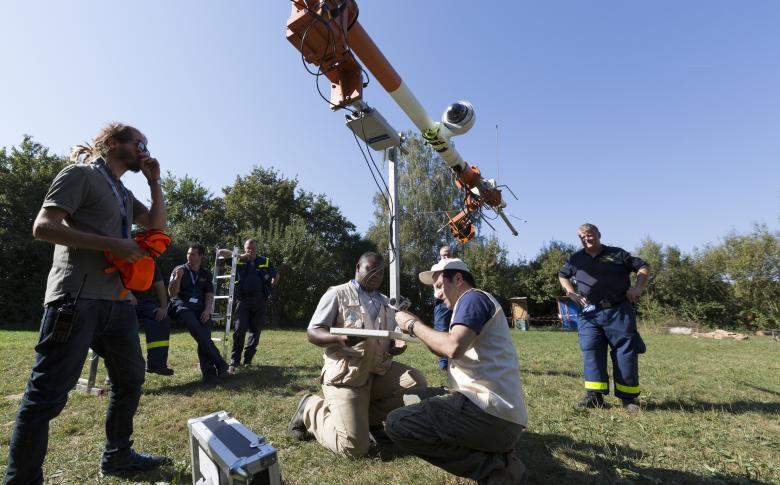
OpEx Bravo: It is all about teamwork

Sunshine and hot temperatures were not the only unusual occurrence in mid-September in the little German town of Neuhausen, near Stuttgart. The training site of the German Federal Agency for Technical Relief (THW) was transformed into a simulated humanitarian emergency for OpEx Bravo 2016 – a large scale disaster response exercised coordianted by the World Food Programme (WFP), as global lead of the Emergency Telecommunications Cluster (ETC), in conjunction with THW.

During this year’s edition, 20 participants from 11 organisations worked together to respond to the devastating - but thankfully fictional - earthquake in ‘Tukastan’. Humanitarian hubs were set up with tents and telecommunications equipment, including the inflatable emergency.lu rapid deployment kit, Ericsson Reponses’s WIDER for Internet management and distribution, as well as three 45-meter THW towers. Participants moved between hubs, operating at maximum energy levels (and instant coffee), as if lives were at stake.

OpEx Bravo provides hands-on emergency experience to Information Technology (IT) managers, technicians and team leaders in a complex, high-pressure, but controlled environment. Participants are expected to work in teams to deploy ETC services under tight timeframes and challenging conditions, intensified by 'social interaction' scenarios performed by THW role-players. Wayne Ffoulkes, Training Manager of WFP Fast Information Technology and Telecommunications Emergency and Support Team (FITTEST) Training Services says, “OpEx Bravo allows the participants to get practical experience with technical solutions adopted by the ETC and enhance their ability to operate outside their normal urban environments.”

With new equipment and tools being introduced to the ETC toolbox, this year's OpEx Bravo was particularly interesting. ETC Location Services, allowing track of staff and equipment, was deployed for the first time in a training environment. Ericsson Response also tested a new configuration of its WIDER system.

Of course, it is about more than just the equipment. Gilles Hoffmann, emergency.lu Coordinator from the Government of Luxembourg, admits that the technicians would not need to travel to Germany to train deploying VSAT or Wi-Fi systems alone. “It’s all about partnership, teamwork and personal relationships, for both, participants and exercise staff,” he says.

The importance of teamwork for the facilitators themselves, was highlighted by Elaine Burroughs, from Save the Children. “Communication is a critical part to the coordination of any rapid onset emergency response and often we are deployed to situations where there are no surviving local infrastructure," says Elaine. "So speed is of the essence and if you know each other, your tasks, and the equipment, then it enables us to provide vital, lifesaving connections so much faster.”

Each edition of the training is different, due to the human spontaneity. In fact, this year, on the first day participants deployed to a location that did not align with the standard OpEx timeline and script. Exercise staff allowed the participants to follow their own solution and adjusted the exercise accordingly, adding ad-hoc scenarios.

This year, participants were quick in setting up the equipment, but also thought of additional components that have never been covered before – included services for affected populations. The participants designed a user-satisfaction survey, gathering data on users from the ‘local community’ which, while not yet included in the ETC Services Catalogue, is very much in line with the ETC2020 strategy that is soon to become the standard way of ETC response.

While participants’ learning experience in terms of ETC-used technologies and soft skills are key objectives, it is the personal interactions and networking that add significant value to such a course, as these shared experiences create bonds between the participants. “It is a great event, which forces the participants to get far out of their comfort zone and to experience personal limits," says Lars Ruediger from Ericsson Response. "And not to forget the growing personal network – OpEx participants usually become kind of league.” A league that keeps the scenarios secret, so that the next generations can benefit from and enjoy the exercise and the team-working just as much!
Photos: Rob Buurveld & Katarzyna Chojnacka
Story: Katarzyna Chojnacka, WFP IT Emergency Management branch